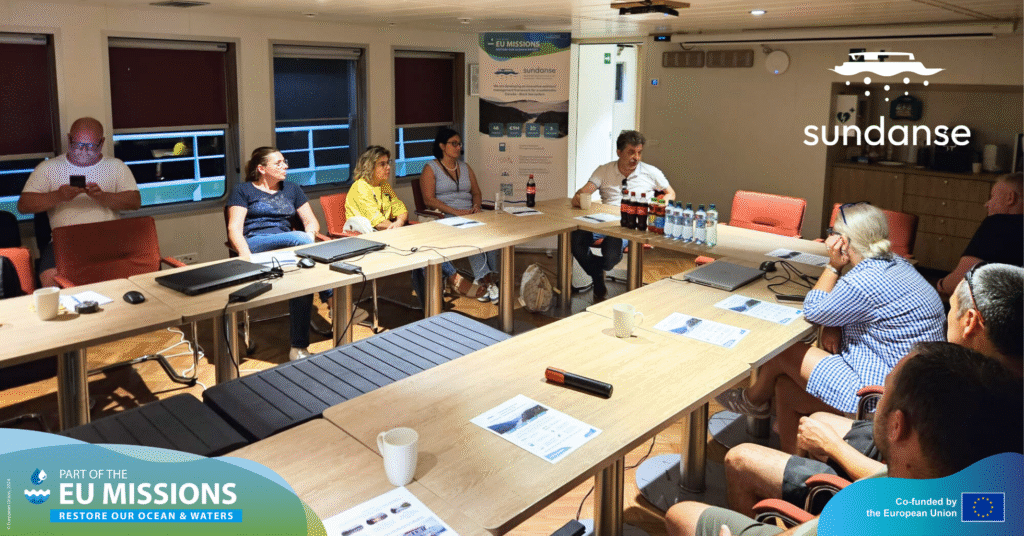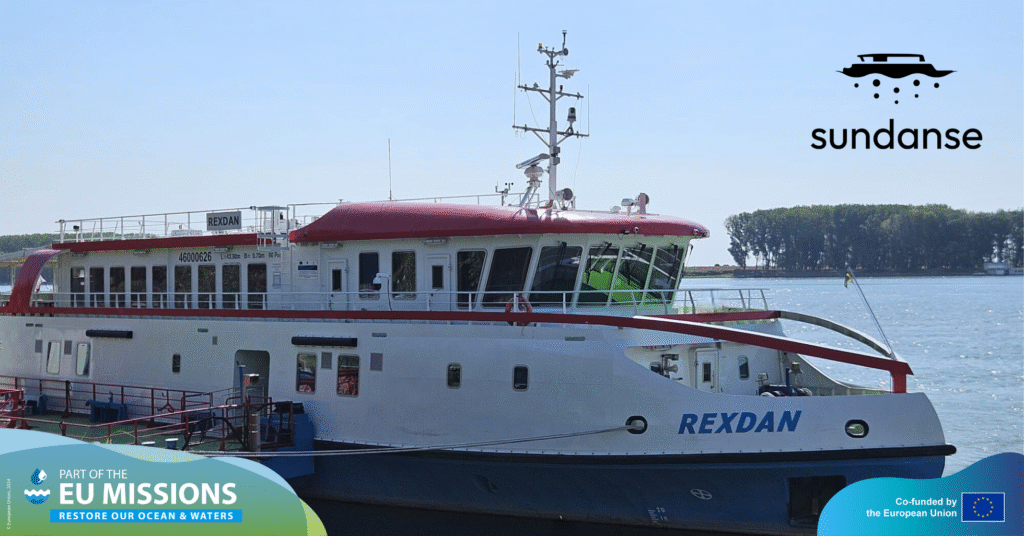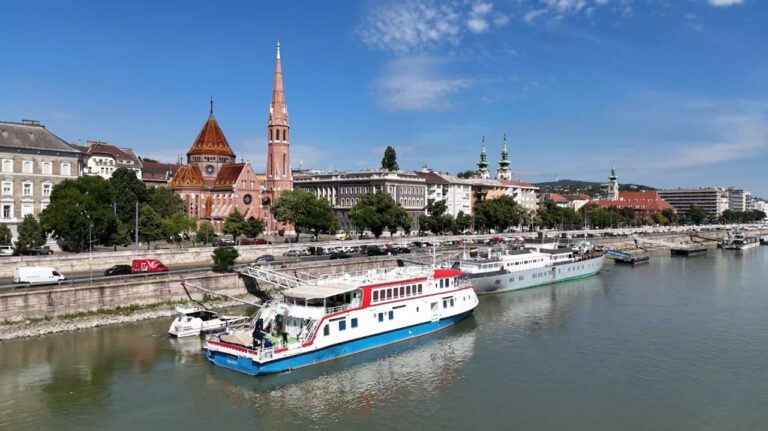REXDAN’s Regional Mission on a Danube River
Led by our Coordinator, Universitatea „Dunărea de Jos” din Galați, the SUNDANSE project has successfully concluded a landmark regional mission on the Danube River. From July 14 to August 10, the advanced research vessel REXDAN embarked on a journey from Galați, Romania, to Vienna, Austria, and back to its home port. This expedition was far more than a voyage, it was a mobile platform for science, diplomacy, and collaboration, bringing together a diverse array of stakeholders to tackle the complex challenges facing Europe’s great river.
During this incredible journey, REXDAN made six stops across five different countries: Bulgaria, Serbia, Slovakia, Hungary and Austria.
First stop: Ruse, Bulgaria
The REXDAN research vessel received a warm welcome in Ruse, Bulgaria, on July 15. A diverse set of visitors, including representatives from “Angel Kanchev” University of Ruse, PK Metal, Silistra, and the Bulgarian Maritime Administration, joined aboard. The event also attracted significant media attention from Bulgarian News Agency (BTA) and Kiss 13 TV. The discussions brought together participants from the private sector, academia, and media to explore REXDAN laboratories, scientific activities and discuss future collaboration. This stop served as a prime example of successful knowledge exchange and public engagement, showcasing the vessel’s potential as a powerful tool for scientific and interdisciplinary cooperation.
Second stop: Belgrade, Serbia
From July 20-21, together with our Serbian partners from the University of Novi Sad – Faculty of Science and Faculty of Technical Sciences, REXDAN welcomed a wide range of distinguished guests in Belgrade, including representatives from the Institute of Physics, the University of Belgrade, PLOVPUT, Institute for the Application of Nuclear Energy (INEP), Serbian Environmental Protection Agency (SEPA), and the Ministry of Environmental Protection. Industry players, including Stanković School, Chartwell School, Superlab Belgrade, Virgin Voyages Belgrade and ARCUS Belgrade were also interested in exploring REXDAN.
The primary focus was to strengthen the connection between scientific research and policy-making. Attendees were given an exclusive tour of the vessel’s nine advanced laboratories and introduced to state-of-the-art riverine monitoring methodologies. The discussions were highly productive, with participants suggesting annually similar dissemination events for future interactive engagements. New research project ideas were also proposed, highlighting a shared commitment to developing solutions like unmanned vessels for river system monitoring and comprehensive bathymetry recognition.
Third stop: Budapest, Hungary
The REXDAN vessel’s stop in Budapest was dedicated to addressing the delicate balance between the Danube’s economic and ecological needs. Onboard, stakeholders from institutions like Budapest University of Technology and Economics, Budapest Metropolitan University, Ludovika University of Public Service, the General Directorate of Water Management (GDWM), Romanian Embassy in Budapest, Budapest Member Institution of Pest County Pedagogical Service (PMPSZ), Aqua-Terra Lab, E‑2000‑CONSULT, Public Port of Baja, and the Budapest Dock Freeport Logistic and Industrial Park engaged in focused discussions. The visit was covered by two media companies: NAVIGÁTORVILÁG and TTG Hungary.
The key topics revolved around the Danube’s hydrology and morphological characteristics, with particular attention paid to the impact of low water levels on commercial shipping. Experts presented insights on how seasonal changes and climate variability affect water flow and navigation. The dialogue emphasized the need for coordinated actions among riparian countries and explored innovative solutions to enhance navigation safety without compromising the river’s ecological health.
Fourth stop: Bratislava, Slovakia
The visit in Bratislava on July 28, brought together representatives from the Slovak University of Technology (STUBA), the Institute of Landscape Ecology, Slovak Academy of Science and the Romanian Embassy. Attendees received a guided tour of REXDAN’s laboratories, where the research team demonstrated equipment for measuring bathymetric and hydrological parameters, analysing microplastics and pharmaceutical pollution, and monitoring air quality. The participants’ feedback was overwhelmingly positive, with researchers expressing keen interest in future bilateral partnerships and collaborative opportunities aboard the vessel. This stop significantly contributed to building regional cooperation in Danube research, reinforcing REXDAN’s role as an essential platform for monitoring and protecting the river.
Fifth stop: Vienna, Austria
In Vienna, together with our partner University of Vienna, the REXDAN vessel hosted a high-level session, marking the end of its outward journey. Stakeholders and embassy representatives, including officials from the Federal Ministry of Foreign Affairs, the German Embassy, Serbian Embassy, Republic of Moldova Embassy, Romanian Embassy, Regional Parliament of Vienna, Romanian Cultural Institute in Vienna, Vienna City Council, Institute of Hydraulic Engineering and River Research, Department of Water and Infrastructure from BOKU University, eLTER/UFZ – Integrated European Long‑Term Ecosystem, Critical Zone and Socio‑Ecological Research Infrastructure and Danube Strategy Point, convened to address pressing issues related to waterway management.
Discussions covered critical topics such as the impact of sediment flow, water quality challenges, and the presence of emerging pollutants. Participants underscored the importance of collaborative efforts to balance ecological preservation with the economic benefits of improved navigation. The session concluded with actionable insights aimed at enhancing regional coordination and safeguarding water systems for future development.
Sixth stop: Novi Sad, Serbia
In Novi Sad, Serbia, on August 5, the REXDAN team was once again warmly welcomed by our Serbian partners, the University of Novi Sad, Faculty of Sciences, and the Faculty of Technical Sciences, University of Novi Sad. During the REXDAN research vessel’s visit to Novi Sad, the project hosted over 50 participants from a wide range of institutions. These included representatives from public agencies such as the Serbian Environmental Protection Agency, public and private companies like PWMC „Vode Vojvodine“ and „Hidrozavod DTD“, and academic staff from Universities in Belgrade, Niš, Kragujevac, and Novi Sad. The visit also attracted interest of the Radio-televizija Vojvodine (RTV), Serbian national television.
The event was organised into three separate groups, each receiving a presentation on the SUNDANSE project followed by a guided tour. Visitors were given a firsthand look at the vessel’s advanced facilities, including the laboratories used for sediment sample analysis. Participants expressed their strong appreciation for the on-board equipment and initiated a discussion about the potential for using REXDAN for additional research activities and collaborations beyond the scope of the SUNDANSE project. This final stop served as a fitting end to a successful mission, highlighting the project’s commitment to broad engagement.
REXDAN’s return to Galați, Romania
On August 8, the REXDAN team organised a visiting workshop in the port of Giurgiu, Romania, in collaboration with SUNDANSE partner AFDJ Giurgiu. During this final engagement, the vessel’s research facilities were showcased, and discussions were held regarding the environmental data collected during the Galați-Vienna voyage.
The mission officially concluded on August 10, when the REXDAN vessel safely returned to its home port in Galați, Romania. The data gathered, the connections made, and the knowledge shared during this expedition will now serve as the foundation for the next phase of the SUNDANSE project.


SUNDANSE’s synergies with EU initiatives
SUNDANSE team was happy to welcome aboard Restore4Life, MicroDrink and iNNOSED project representatives. Across six key stops in four different countries, REXDAN served as a floating hub for knowledge exchange and networking with other EU-funded initiatives, close to SUNDANSE in their mission and activities.
The mission’s success highlights the importance of international cooperation in achieving sustainable river management, balancing ecological preservation with the economic vitality of the Danube.
In the news!
On August 5, 2025, Serbia’s national television, RTV, covered the REXDAN regional Danube mission in its news broadcast.
Take a look at the video below!
Audiovisual rights for this material belong to RTV.
